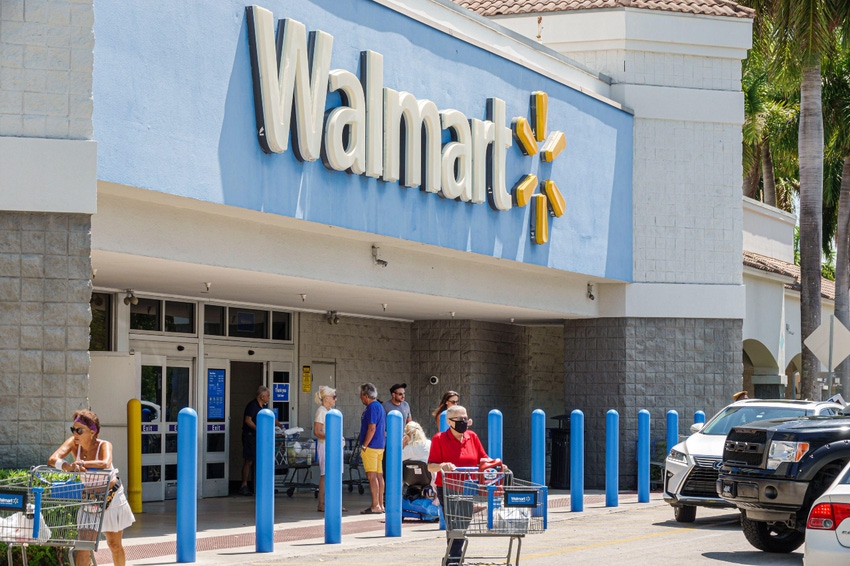Walmart's MobileX deal: a look at the wild world of wireless retail
Retailing giant Walmart is adding wireless services from a tiny startup, MobileX, to store shelves. The move could be a response to competitive actions – or a way to offer cheaper services.

At a Glance
- Walmart offers a variety of prepaid brands and is adding MobileX to the mix.
- Walmart could be responding to actions by Verizon, T-Mobile, Amazon and others.
- The move is important because most wireless purchases are conducted in physical stores.
Last week the nation's biggest retailer said it would start selling wireless services from a tiny startup that promises to use AI to cut customers' bills. According to some observers, the move by Walmart is an effort to respond to the increasingly tangled retailing landscape for wireless services. But others argued that Walmart's new deal with MobileX is just another way for the retailer to sell cheap stuff.
"They just want to provide value offerings," said analyst Jeff Moore of Wave7 Research, a firm that closely tracks the US wireless industry's retail marketplace.
Moore said that Walmart's basic wireless strategy hasn't changed: The company sells inexpensive prepaid wireless offerings from a variety of brands and is simply adding MobileX into the mix.
But analyst Roger Entner, of Recon Analytics, views the new Walmart/MobileX deal in a wider context. "The rivalry between Amazon and Walmart is as intense as it gets," he wrote in a recent post on FierceWireless. "After Amazon struck a deal with Dish for Boost Infinite for Prime customers, it was only a matter of time – two months to be exact – before Walmart struck back with its exclusive MobileX deal."
Entner argued that recent developments in the wireless retail marketplace – including Amazon's deal to sell Dish Network's Boost Infinite postpaid service – drove Walmart to look for some kind of competitive response.
A big deal and bigger dreams
If Walmart is indeed teaming up with MobileX as a response to Amazon's Boost Infinite offer, it would be somewhat ironic considering both Boost and MobileX were started by Peter Adderton.
Adderton founded Boost Mobile in Australia in 2000 and then sold the company's US business to Nextel. Boost then subsequently passed through Sprint, T-Mobile and, most recently, Dish Network. Adderton pursued a purchase of Boost's US business from T-Mobile before losing that deal to Dish, and he remains a vocal critic of Dish. Adderton also still operates a Boost-branded wireless business in Australia from his home in California.
Adderton's latest gambit, MobileX, uses AI to predict how much data customers may need in the future. As a result, they only pay for the data they need rather than a more expensive unlimited plan. MobileX's services start at around $4 per month and range up to around $30.
The startup initially sold its service online when it launched earlier this year but said last week that Walmart would be its exclusive big-box retailer, offering MobileX services via a prominent placement inside roughly 4,000 Walmart stores.
Next up for MobileX is an expansion among independent wireless dealers in the US, broader international expansion and potentially an initial public offering.
A firm aversion to the Internet
According to Adderton, it's essential for wireless service providers to sell their wares through a real, physical retail store. Entner agreed, writing that "the share of online sales of wireless stubbornly stays below 20%. The percentage of online sales of mattresses is roughly twice as high."
That might come as a surprise to those outside the industry who are increasingly using their phones to purchase everything from motor oil to laundry detergent. But even so, a wide range of wireless brands – from AirVoice Wireless to Total by Verizon to Consumer Cellular – are expanding their brick-and-mortar retail operations.
And those efforts build on the extensive retail footprints of longtime wireless providers like T-Mobile, Verizon and AT&T as well as newer entrants like Comcast, Charter Communications, Altice and Cox. After all, it's difficult to buy anything on a phone that hasn't been properly activated or is suffering from a glitch or break.
In any case, wireless retailing remains decidedly difficult. Costco, for example, is now experimenting with sales of various wireless services in its massive retail stores after Wireless Advocates, which ran the wireless kiosks in most Costco stores, abruptly shut down, according to FierceWireless.
Responses on top of responses
So, why would Walmart pursue a distribution agreement with a tiny startup like MobileX?
As noted by Entner, of Recon Analytics, a lot of consolidation has happened in the wireless industry in recent years. TracFone, by far the nation's biggest prepaid provider, was acquired by Verizon. That purchase also included the Straight Talk brand that TracFone initially launched through Walmart.
Further, GreatCall, an MVNO targeting seniors, was acquired by Best Buy. And more recently, Mint Mobile was acquired by T-Mobile.
Some of those brands, like Mint Mobile, are primarily sold online. But it's possible that Verizon's purchase of TracFone – along with its wide family of prepaid brands – could ultimately funnel shoppers away from Walmart stores.
MobileX is a new brand untethered to any of the market's big players, including those that already have an established retail strategy.
"Getting an independent brand like MobileX is a smart move from Walmart as it gives its customers more choice and strengthens its bargaining position vis-à-vis all other partners," Entner wrote.
Or maybe Walmart liked MobileX's AI-based offer to "see how much you could save."
Read more about:
AIAbout the Author(s)
You May Also Like












